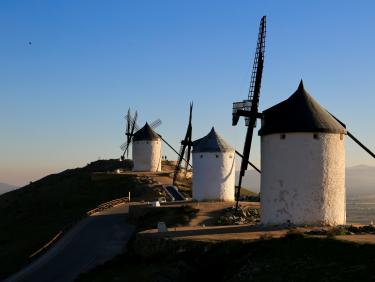Faculty of Modern Languages Spanish / Romance Studies
Romance studies considers Romance languages, literature and cultures. The focus in Spanish is on the Spanish-speaking world.
Romance studies covers research and teaching in the field of Romance languages, literature and cultures. The most important Romance languages, which all derive from Latin, include French, Spanish, Italian, Portuguese, Romanian, Occitan, Catalan, Gaelic, Sardinian and Rhaeto-Romanic. Variants of these Romance languages, literatures and cultures are also found outside Europe, in parts of Latin America, Canada, North and West Africa.
Degree courses in Spanish encompass areas of Spanish language, literature and cultural studies. In addition to this content, students attend language sessions which are conducted exclusively by native speakers from Spain or Latin America.

Special Features and Characteristics
- Erasmus cooperation agreements with 14 Spanish universities, university cooperation agreements with the Colegio de México in Mexico City and the Universidad de Chile in Santiago
- interdisciplinary and international research networks via the Heidelberg Center for Ibero-American Studies (HCIAS)
- internal and external links with different research centres, for example the European Linguistics Centre (Europäischen Zentrum für Sprachwissenschaften, EZS)
- numerous international research contacts, for example with the Departamento de Filología Española of the Universidad de La Laguna (Tenerife); participation in the international research network Plataforma hispanoalemana: Saberes humanísticos y formas de vida and in the international project Sujeto e Institución Literaria en la Edad Moderna (Universidad de Córdoba, Spain)
- Participation in the research training group for doctoral students Was ist Tradition?
- Special research area 933, material text cultures, TP C09: Body markings: Text and body in pre-modern Iberian literature
- specific formats for teaching sessions
Research
The main research interests in linguistics are:
- language history, language change and language contact with relevance to Spanish
- synchronised and diachronic analyses of syntax, semantics and morphology
- variational linguistics
- historical sociolinguistics and pragmatics, discourse linguistics
- language standardisation and language criticism
- evidentiality
Literary studies are anthropological, poetical and comparative in their approach. Main research interests (in connection with the literary history of all major Romance languages) are:
- Theater in the 16th/17th century
- Spanish Conceptismo: Góngora, Gracián
- Cervantes
- The Latin American novel in the 20th century
- Literary theory
- Hermeneutics and deconstruction
- Transgressions between literature and philosophy
- Psychoanalysis and literature
- Figurative insight
- Medieval historiography
- Novela sentimental (15th century)
- The Spanish picaresque novel
- Colonial literature (15th to 18th century)
- Theater Siglo de Oro
- Pre-modern science and literature
- Latin American fiction 1800-today
- Literature and subjectivity
- Literature and ideology
- Decolonisation
- Latin American philosophy of culture
- Theories of the subaltern
- Latin American literary theory
Occupational Areas
Graduates of a degree programme in Spanish may pursue a career in the following fields:
- teaching (German secondary school - Gymnasium)
- training and consulting institutions
- universities and research institutes
- media
- communications and translation
- publishing
- tourism
- and other fields in which knowledge of the Spanish language, literature and culture is of benefit.
Insights

I have enjoyed earning Spanish ever since 8th grade – I enjoyed it more than English. And as Spanish is a world language that is used in many countries around the world, I thought ‘why not study what I enjoy and use the opportunity to learn more about the languages and cultures of Spain and Latin America’?
Nathalie Schürmann, 22, Spanish/Romance studies, 7th semester Bachelor



